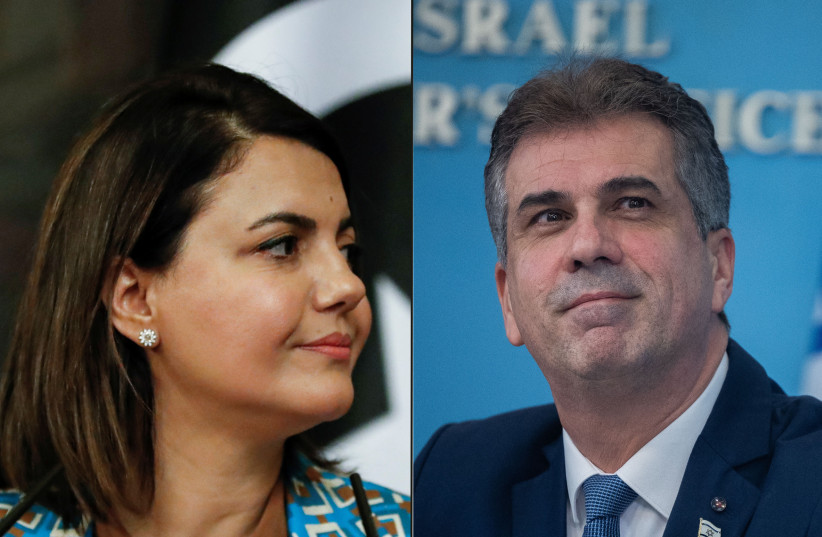Israel-Libya diplomatic debacle could slow Saudi peace – ex-top Mossad official
Former senior Mossad official Haim Tomer on Tuesday said that the fiasco surrounding the public exposure of the Israeli-Libyan official meetings could slow ongoing processes to try to advance normalization with the Saudis.
Tomer said that certain Israeli officials had clearly forgotten the secret rules that are supposed to apply to meeting with officials of countries with whom Jerusalem does not yet have diplomatic relations, but with whom it hopes to move in that direction.
The former head of the Tevel foreign relations section of the Mossad said that “the most important thing for them [the Saudis] is handling everything secretly vis-à-vis Israel.”
Libyan FM flees country, fired after meeting with Eli Cohen
Libyan Foreign Minister Najla Mangoush was fired on Monday for meeting in Rome last week with Foreign Minister Eli Cohen.
Cohen had framed the meeting as a historic step toward establishing diplomatic relations, but his decision to publicize the event led to such a strong backlash within Libya, that Mangoush’s future and any future meetings are uncertain.
Prime Minister Benjamin Netanyahu has tried to mitigate the damage, including by issuing a statement that going forward, no similar meetings will be made public without his approval, a strong implicit criticism of Cohen.
 Libyan Foreign Minister Najla Mangoush (left) and Israeli Foreign Minister Eli Cohen (credit: MAXIM SHIPENKOV/POOL VIA REUTERS/FILE PHOTO, YONATAN SINDEL/FLASH90)
Libyan Foreign Minister Najla Mangoush (left) and Israeli Foreign Minister Eli Cohen (credit: MAXIM SHIPENKOV/POOL VIA REUTERS/FILE PHOTO, YONATAN SINDEL/FLASH90)Tomer said that Israel’s diplomatic debacle had likely harmed relations with Italy, which had helped the sides come together.
Also, he said now that, “Libya would postpone Israeli normalization for another time. The Saudis are very sensitive to secrecy for public profiles. The King is undercurrents of criticism from different Wahabi groups and others.
In addition, he stated that Riyadh “does not need to pay a price in that arena for the stupidity of other countries.”
Rather, he said that the Saudis wish to present any possible future deal with Israel “as a fait accompli: We get a strategic agreement with Israel and with the US. We took care of the Palestinians, the Iranian threat,” but that none of this would come out publicly “one second before it is [fully] cooked and agreed.”
The former top Mossad official explained that in the past, he and clandestine officials secretly held talks, “Sometimes even with Syria, Hezbollah, enemies, with the most successful [talks leading to the] Abraham Accords – signed after about 25 years of secret under the table relations, handled mainly by the Mossad, and a little bit of the Foreign Ministry. It was all secret, with no leaks and lots of confidence of all of the parties.”
He advocated returning Libya and other tracks to sole handling by the Mossad, without allowing political officials like Cohen to be in a position, where populist ambitions might get the better of them in a moment of weakness.
Libyan government in Tripoli looking over its shoulder
Further, Tomer said that part of the problem was that the Libyan government in Tripoli is still looking over its shoulder at its opposition in Benghazi, which means it is ultra-sensitive to criticism even of policies that it might believe in if the process is still half-baked.
The bottom line, he said, was that it was critical for the Netanyahu government and the Mossad to sufficiently reassure the Saudis that the Libyan debacle would not be repeated.
Questioned about the fact that Netanyahu himself previously upset the Saudis in 2020 when he leaked an alleged meeting with Saudi Crown Prince Mohammed Bin Salaman in Saudi Arabia under the auspices of then US Secretary of state Mike Pompeo, he responded that the Saudis had likely already moved beyond that incident and knew Netanyahu’s weaknesses as well as his strengths.





Comments are closed.